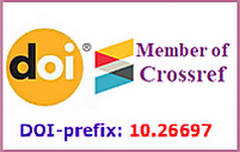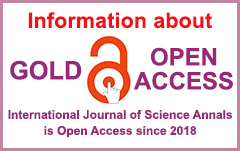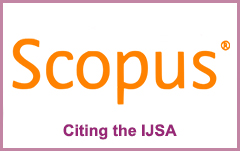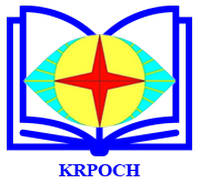Melnyk Y. B. 1,2, Pypenko I. S. 1,2
| 1 Kharkiv Regional Public Organization “Culture of Health”, Ukraine 2 Scientific Research Institute KRPOCH, Ukraine |
Abstract
Background and Aim of Study: The use of artificial intelligence (AI) by students and teachers in higher education is becoming increasingly common. AI implementing in higher education started as a spontaneous process among all stakeholders. Strategies and models of implementation in higher education systems must now justify this.
The aim of the study: to explore the benefits and challenges of using AI in academic university teaching, and to develop and justify a model for the optimal implementation of AI for the development of the higher education ecosystem.
Material and Methods: The present study used several theoretical methods: analysis, synthesis, comparison, generalisation, systematisation, and classification to define the benefits and challenges of AI use by stakeholders; systems approach, modelling, and optimisation methods to develop a model for the optimal implementation of AI in a higher educational ecosystem.
Results: The prospects of AI implementation for developing the higher education ecosystem are considered. The advantages and problems of using AI in academic university teaching are characterised based on the classification of directions of using AI in higher education. The model of optimal implementation of AI in the educational ecosystem of higher education, based on the systems approach, has been developed and substantiated. This model include structural (universities, faculties, departments, institutes, centres, doctoral schools, clinics, and labs) and functional (internal – content of education, forms and methods of teaching, diagnosing of learning outcomes, administering of educational service, and eternal – include academic achievement: levels of knowledge, skills, and competences) components.
Conclusions: The study highlights the importance of implementing AI in higher education, as well as the need for collaboration between all university stakeholders in the digitisation of education. The results are essential for developing university strategies for developing educational ecosystem The curriculum should be relevant, meeting the interests of students and the current needs of employers. Education stakeholders are encouraged to use the available benefits of AI responsibly to address the challenges of student learning and teacher organisation in universities.
Keywords
artificial intelligence, higher education, Human-AI System, educational ecosystem, benefits and challenges of artificial intelligence, stakeholders in higher education
References
Abulibdeh, A., Zaidan, E., & Abulibdeh, R. (2024). Navigating the confluence of artificial intelligence and education for sustainable development in the era of industry 4.0: Challenges, opportunities, and ethical dimensions. Journal of Cleaner Production, 437, Article 140527. https://doi.org/10.1016/j.jclepro.2023.140527
Ahmad, S. F., Alam, M. M., Rahmat, M. K., Mubarik, M. S., & Hyder, S. I. (2022). Academic and administrative role of artificial intelligence in education. Sustainability, 14(3), Article 1101. https://doi.org/10.3390/su14031101
Alam, A. (2022, April). A digital game based learning approach for effective curriculum transaction for teaching-learning of artificial intelligence and machine learning. In 2022 International Conference on Sustainable Computing and Data Communication Systems (ICSCDS) (pp. 69-74). IEEE. https://doi.org/10.1109/ICSCDS53736.2022.9760932
Aleedy, M., Atwell, E., & Meshoul, S. (2022). Using AI chatbots in education: Recent advances challenges and use case. In M. Pandit, M. K. Gaur, P. S. Rana, & A. Tiwari. (Eds.), Artificial Intelligence and Sustainable Computing. Algorithms for Intelligent Systems (pp. 661–675). Springer. https://doi.org/10.1007/978-981-19-1653-3_50
Al-Sharafi, M. A., Al-Emran, M., Iranmanesh, M., Al-Qaysi, N., Iahad, N. A., & Arpaci, I. (2023). Understanding the impact of knowledge management factors on the sustainable use of AI-based chatbots for educational purposes using a hybrid SEM-ANN approach. Interactive Learning Environments, 31(10), 7491-7510. https://doi.org/10.1080/10494820.2022.2075014
Al-Zahrani, A.M., & Alasmari, T.M. (2024). Exploring the impact of artificial intelligence on higher education: The dynamics of ethical, social, and educational implications. Humanities and Social Sciences Communications, 11, Article 912. https://doi.org/10.1057/s41599-024-03432-4
Baidoo-Anu, D., & Ansah, L. O. (2023). Education in the era of generative artificial intelligence (AI): understanding the potential benefits of ChatGPT in promoting teaching and learning. Journal of AI, 7(1), 52–62. https://doi.org/10.61969/jai.1337500
Banihashem, S. K., Kerman, N. T., Noroozi, O., Moon, J., & Drachsler, H. (2024). Feedback sources in essay writing: peer-generated or AI-generated feedback? International Journal of Educational Technology in Higher Education, 21(1), Article 23. https://doi.org/10.1186/s41239-024-00455-4
Bannister, P., Alcalde Peñalver, E., & Santamaría Urbieta, A. (2024). International students and generative artificial intelligence: A cross-cultural exploration of HE academic integrity policy. Journal of International Students, 14(3), 149-170. https://doi.org/10.32674/jis.v14i3.6277
Bhaskar, P., Tiwari, C. K. & Joshi, A. (2021). Blockchain in education management: Present and future applications. Interactive Technology and Smart Education, 18(1), 1-17. https://doi.org/10.1108/ITSE-07-2020-0102
Bond, M., Khosravi, H., De Laat, M., Bergdahl, N., Negrea, V., Oxley, E., Pham, P., Chong, S. W., & Siemens, G. (2024). A meta systematic review of artificial intelligence in higher education: A call for increased ethics, collaboration, and rigour. International Journal of Educational Technology in Higher Education, 21, Article 4. https://doi.org/10.1186/s41239-023-00436-z
Celik, I., Dindar, M., Muukkonen, H., & Järvelä, S. (2022). The promises and challenges of artificial intelligence for teachers: a systematic review of research. TechTrends, 66, 616–630. https://doi.org/10.1007/s11528-022-00715-y
Chalkiadakis, A., Seremetaki, A., Kanellou, A., Kallishi, M., Morfopoulou, A., Moraitaki, M., & Mastrokoukou, S. (2024). Impact of artificial intelligence and virtual reality on educational inclusion: A systematic review of technologies supporting students with disabilities. Education Sciences, 14(11), Article 1223. https://doi.org/10.3390/educsci14111223
Chen, L., Chen, P., & Lin, Z. (2020). Artificial intelligence in education: A review. IEEE Access, 8, 75264–75278. https://doi.org/10.1109/ACCESS.2020.2988510
Clugston, B. (2024). Advantages and disadvantages of AI in education. https://www.ucanwest.ca/blog/education-careers-tips/advantages-and-disadvantages-of-ai-in-education/
Crompton, H., Jones, M. V., & Burke, D. (2022). Affordances and challenges of artificial intelligence in K-12 education: A systematic review. Journal of Research on Technology in Education, 56(3), 248–268. https://doi.org/10.1080/15391523.2022.2121344
Dai, R., Thomas, M. K. E., & Rawolle, S. (2024). The roles of AI and educational leaders in AI-assisted administrative decision-making: a proposed framework for symbiotic collaboration. The Australian Educational Researcher, 1-17. https://doi.org/10.1007/s13384-024-00771-8
Darvishi, A., Khosravi, H., Sadiq, S., & Gašević, D. (2022). Incorporating AI and learning analytics to build trustworthy peer assessment systems. British Journal of Educational Technology, 53(4), 844-875. https://doi.org/10.1111/bjet.13233
Divekar, R. R., Drozdal, J., Chabot, S., Zhou, Y., Su, H., Chen, Y., Zhu, H., Hendler, J. A., & Braasch, J. (2022). Foreign language acquisition via artificial intelligence and extended reality: Design and evaluation. Computer Assisted Language Learning, 35(9), 2332-2360. https://doi.org/10.1080/09588221.2021.1879162
Escalante, J., Pack, A., & Barrett, A. (2023). AI-generated feedback on writing: insights into efficacy and ENL student preference. International Journal of Educational Technology in Higher Education, 20(1), Article 57. https://doi.org/10.1186/s41239-023-00425-2
Fachada, N., Barreiros, F. F., Lopes, P., & Fonseca, M. (2023, August). Active learning prototypes for teaching game AI. In 2023 IEEE Conference on Games (CoG) (pp. 1-4). IEEE. https://doi.org/10.1109/CoG57401.2023.10333229
González-Calatayud, V., Prendes-Espinosa, P., & Roig-Vila, R. (2021). Artificial Intelligence for Student Assessment: A Systematic Review. Applied Sciences, 11(12), Article 5467. https://doi.org/10.3390/app11125467
Guo, K., Zhang, E. D., Li, D., & Yu, S. (2024). Using AI‐supported peer review to enhance feedback literacy: An investigation of students’ revision of feedback on peers’ essays. British Journal of Educational Technology. https://doi.org/10.1111/bjet.13540
Gupta, P., Yadav, D., & Dey, R. (2021). AI diagnosis: Rise of AI-powered assessments in modern education systems. Transnational Marketing Journal, 9(3), 625-633. https://www.ceeol.com/search/article-detail?id=998415
Han, Z. (2024). ChatGPT in and for second language acquisition: a call for systematic research. Studies in Second Language Acquisition, 46(2), 301-306. https://doi.org/10.1017/S0272263124000111
Hooda, M., Rana, C., Dahiya, O., Rizwan, A., & Hossain, M. S. (2022). Artificial intelligence for assessment and feedback to enhance student success in higher education. Mathematical Problems in Engineering, 2022(1), Article 5215722. https://doi.org/10.1155/2022/5215722
Hopcan, S., Polat, E., Ozturk, M. E., & Ozturk, L. (2023). Artificial intelligence in special education: A systematic review. Interactive Learning Environments, 31(10), 7335–7353. https://doi.org/10.1080/10494820.2022.2067186
Kanja, M. W., & Paschal, M. J. (2023). AI game activities for teaching and learning. In Creative AI Tools and Ethical Implications in Teaching and Learning (pp. 153-167). IGI Global. https://doi.org/10.4018/979-8-3693-0205-7.ch008
Kolchenko, V. (2018). Can modern AI replace teachers? Not so fast! Artificial intelligence and adaptive learning: personalized education in the AI age. HAPS Educator, 22(3), 249-252. https://doi.org/10.21692/haps.2018.032
Li, Y. (2024). Usability of ChatGPT in second language acquisition: Capabilities, effectiveness, applications, challenges, and solutions. Studies in Applied Linguistics and TESOL, 24(1). https://doi.org/10.52214/salt.v24i1.12864
Loukil, F., Abed, M. & Boukadi, K. (2021). Blockchain adoption in education: a systematic literature review. Education and Information Technologies, 26, 5779–5797. https://doi.org/10.1007/s10639-021-10481-8
Luckin, R., & Cukurova, M. (2019). Designing educational technologies in the age of AI: A learning sciences-driven approach. British Journal of Educational Technology, 50(6), 2824–2838. https://doi.org/10.1111/bjet.12861
Ma, D., Akram, H., & Chen, I. H. (2024). Artificial intelligence in higher education: a cross-cultural examination of students’ behavioral intentions and attitudes. International Review of Research in Open and Distributed Learning, 25(3), 134-157. https://doi.org/10.19173/irrodl.v25i3.7703
Malgieri, G., & Pasquale, F. (2024). Licensing high-risk artificial intelligence: toward ex ante justification for a disruptive technology. Computer Law & Security Review, 52, Article 105899. https://doi.org/10.1016/j.clsr.2023.105899
Melnyk, Yu. B., & Pypenko, I. S. (2024). Artificial intelligence as a factor revolutionizing higher education. International Journal of Science Annals, 7(1), 5–13. https://doi.org/10.26697/ijsa.2024.1.2
Melnyk, Yu. B., & Pypenko, I. S. (2020). How will blockchain technology change education future?! International Journal of Science Annals, 3(1), 5–6. https://doi.org/10.26697/ijsa.2020.1.1
Melnyk, Yu. B., & Pypenko, I. S. (2023). The legitimacy of artificial intelligence and the role of ChatBots in scientific publications. International Journal of Science Annals, 6(1), 5–10. https://doi.org/10.26697/ijsa.2023.1.1
Nazaretsky, T., Mejia-Domenzain, P., Swamy, V., Frej, J., & Käser, T. (2024). AI or Human? Evaluating student feedback perceptions in higher education. In Ferreira Mello, R., Rummel, N., Jivet, I., Pishtari, G., & Ruipérez Valiente, J.A. (Eds.), Lecture Notes in Computer Science: Vol. 15159. Technology Enhanced Learning for Inclusive and Equitable Quality Education (pp 284–298). Springer. https://doi.org/10.1007/978-3-031-72315-5_20
Ouyang, F., Wu, M., Zheng, L., Zhang, L., & Jiao, P. (2023). Integration of artificial intelligence performance prediction and learning analytics to improve student learning in online engineering course. International Journal of Educational Technology in Higher Education, 20(1), Article 4. https://doi.org/10.1186/s41239-022-00372-4
Ouyang, F., & Zhang, L. (2024). AI-driven learning analytics applications and tools in computer-supported collaborative learning: A systematic review. Educational Research Review, 44, Article 100616. https://doi.org/10.1016/j.edurev.2024.100616
Pisica, A. I., Edu, T., Zaharia, R. M., & Zaharia, R. (2023). Implementing artificial intelligence in higher education: Pros and cons from the perspectives of academics. Societies, 13(5), Article 118. https://doi.org/10.3390/soc13050118
Pratama, M. P., Sampelolo, R., & Lura, H. (2023). Revolutionizing education: harnessing the power of artificial intelligence for personalized learning. Klasikal: Journal of Education, Language Teaching and Science, 5(2), 350-357. https://doi.org/10.52208/klasikal.v5i2.877
Pypenko, I. S. (2024). Benefits and challenges of using artificial intelligence by stakeholders in higher education. International Journal of Science Annals, 7(2), 1–9. https://doi.org/10.26697/ijsa.2024.2.7
Pypenko, I. S. (2023). Human and artificial intelligence interaction. International Journal of Science Annals, 6(2), 54–56. https://doi.org/10.26697/ijsa.2023.2.7
Pypenko, I. S., Maslov, Yu. V., & Melnyk, Yu. B. (2020). The impact of social distancing measures on higher education stakeholders. International Journal of Science Annals, 3(2), 9–14. https://doi.org/10.26697/ijsa.2020.2.2
Pypenko, I. S., & Melnyk, Yu. B. (2020). Creating a business ecosystem based on blockchain technology. International Journal of Education and Science, 3(4), 53. https://doi.org/10.26697/ijes.2020.4.26
Raimundo, R., & Rosário, A. (2021). Blockchain system in the higher education. European Journal of Investigation in Health, Psychology and Education, 11(1), 276-293. https://doi.org/10.3390/ejihpe11010021
Rasul, T., Nair, S., Kalendra, D., Robin, M., de Oliveira Santini, F., Ladeira, W. J., Sun, M., Day, I., Rather, R. A., & Heathcote, L. (2023). The role of ChatGPT in higher education: Benefits, challenges, and future research directions. Journal of Applied Learning and Teaching, 6(1), 41-56. https://doi.org/10.37074/jalt.2023.6.1.29
Sajja, R., Sermet, Y., Cikmaz, M., Cwiertny, D., & Demir, I. (2024). Artificial intelligence-enabled intelligent assistant for personalized and adaptive learning in higher education. Information, 15(10), Article 596. https://doi.org/10.3390/info15100596
Salas-Pilco, S. Z., Xiao, K., & Hu, X. (2022). Artificial intelligence and learning analytics in teacher education: A systematic review. Education Sciences, 12(8), Article 569. https://doi.org/10.3390/educsci12080569
Sharma, S., Tomar, V., Yadav, N., & Aggarwal, M. (2023). Impact of AI-based special education on educators and students. In AI-Assisted Special Education for Students with Exceptional Needs (pp. 47-66). IGI Global. https://doi.org/10.4018/979-8-3693-0378-8.ch00
Smerdon, D. (2024). AI in essay-based assessment: Student adoption, usage, and performance. Computers and Education: Artificial Intelligence, 7, Article 100288. https://doi.org/10.1016/j.caeai.2024.100288
Wang, S., Wang, H., Jiang, Y., Li, P., & Yang, W. (2023). Understanding students’ participation of intelligent teaching: An empirical study considering artificial intelligence usefulness, interactive reward, satisfaction, university support and enjoyment. Interactive Learning Environments, 31(9), 5633–5649. https://doi.org/10.1080/10494820.2021.2012813
Wang, T., Lund, B. D., Marengo, A., Pagano, A., Mannuru, N. R., Teel, Z. A., & Pange, J. (2023). Exploring the potential impact of artificial intelligence (AI) on international students in higher education: Generative AI, chatbots, analytics, and international student success. Applied Sciences, 13(11), Article 6716. https://doi.org/10.3390/app13116716
Melnyk Yuriy Borysovych – https://orcid.org/0000-0002-8527-4638; Doctor of Philosophy in Pedagogy, Affiliated Associate Professor; Chairman of Board, Kharkiv Regional Public Organization “Culture of Health” (KRPOCH); Director, Scientific Research Institute KRPOCH, Ukraine.
Pypenko Iryna Sergiivna (Corresponding Author) – https://orcid.org/0000-0001-5083-540X;
| |
APA
Melnyk, Y. B., & Pypenko, I. S. (2025). Implementing of artificial intelligence in a higher educational ecosystem. International Journal of Science Annals, 8(1), 13–20. https://doi.org/10.26697/ijsa.2025.1.1
Harvard
Melnyk, Y. B., & Pypenko, I. S. "Implementing of artificial intelligence in a higher educational ecosystem." International Journal of Science Annals, [online] 8(1), pp. 13–20. viewed 30 June 2025, https://culturehealth.org/ijsa_archive/ijsa.2025.1.1.pdfVancouver
Melnyk Y. B., & Pypenko I. S. Implementing of artificial intelligence in a higher educational ecosystem. International Journal of Science Annals [Internet]. 2025 [cited 30 June 2025]; 8(1): 13–20. Available from: https://culturehealth.org/ijsa_archive/ijsa.2025.1.1.pdf https://doi.org/10.26697/ijsa.2025.1.1












